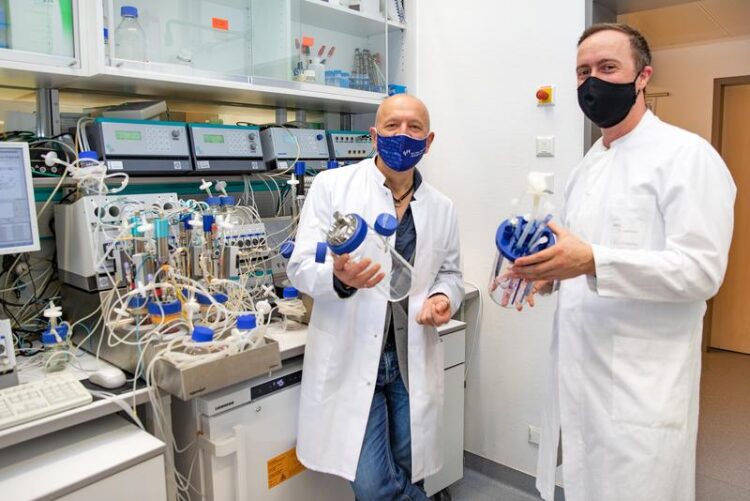Cells of the future

Dr. Robert Zweigerdt and Professor Dr. Nico Lachmann and (from left) with a bioreactor in the laboratory.
Copyright: Karin Kaiser/MHH
New MHH research collaboration aims to develop novel treatment for bacterial lung infections using universal human stem cells
Healing the body with cells – this is the ambitious goal of scientists at Hannover Medical School (MHH). With this in mind, Professor Dr. Nico Lachmann and Dr. Robert Zweigerdt have initiated a research collaboration and license agreement with the pharmaceutical company Novo Nordisk A/S, to combine academic knowhow with the translational power of the industry. The overall aim of the endeavor is to use special stem cells for developing advanced therapies to regenerate failing organs and cure diseases, for which no adequate treatment is currently available. The collaboration agreement was supported by the technology transfer agency Ascenion.
The project relies on so-called induced pluripotent stem cells (iPS cells), which can be obtained from patients’ somatic cells by a technology known as “somatic cell reprogramming”. The special feature of the resulting iPS cells is their ability to give rise to any functional cell type of the human body. Thus, iPS cells can be used to generate specific replacement cells in a dish, which subsequently can be returned to a patient as a cure.
MHH scientists have recently enabled continuous production of iPS cell-derived functional blood cells, including macrophages (phagocytes), by using special bioreactors.
“Within the framework of the new research collaboration, we are now specifically developing this technique further, to enable a potential use of these macrophages therapeutically and eventually aiming for the first application in a clinical study. So far, there has been no clinical application of iPS cell progenies in Germany,” explains Professor Lachmann.
Macrophages as a therapeutic agent for bacterial lung infections
In pre-clinical proof-of-concept experiments, MHH researchers have readily shown that the iPS cells-macrophages have a prominent therapeutic potential to eliminate disease-causing bacteria. Therefore, they have the great potential, for example, for treating patients with severe bacterial infection of the lungs (pneumonia), which do not respond to antibiotics. “The concept of therapeutic application of iPS cell-derived progenies is already about 15 years old. I am very pleased that we can now advance this idea towards real therapies,” says Dr. Zweigerdt.
Professor Lachmann holds a professorship funded by the Cluster of Excellence RESIST and conducts research at the MHH Clinic for Paediatric Pneumology, Allergology and Neonatology. Fundamental work was also performed at the MHH Institute for Experimental Haematology. His laboratory is part of the MHH REBIRTH Research Centre for Translational and Regenerative Medicine and a member of the German Centre for Lung Research (DZL).
Dr. Robert Zweigerdt is a research group leader at the Leibniz Research Laboratories for Biotechnology and Artificial Organs (LEBAO) at the MHH Clinic for Cardiac, Thoracic, Transplantation and Vascular Surgery. His laboratory is also part of the REBIRTH Research Centre for Translational and Regenerative Medicine at MHH and is specialized on developing the production of larger cell quantities in bioreactors.
Cluster of Excellence RESIST: Research to help the most vulnerable
In the Cluster of Excellence RESIST (Resolving Infection Susceptibility), more than 50 teams from six institutions led by the MHH are investigating why people are differently susceptible to infections. Their goal is a better protection of particularly susceptible people from infections. You can find more information on the internet at: http://www.RESIST-cluster.de.
SERVICE:
For further information, please contact Professor Dr. Nico Lachmann, lachmann.nico@mh-hannover.de, telephone 0049 511 532-5266 and Dr. Robert Zweigerdt, telephone 0049 511 532-8733, zweigerdt.robert@mh-hannover.de.
Media Contact
All latest news from the category: Health and Medicine
This subject area encompasses research and studies in the field of human medicine.
Among the wide-ranging list of topics covered here are anesthesiology, anatomy, surgery, human genetics, hygiene and environmental medicine, internal medicine, neurology, pharmacology, physiology, urology and dental medicine.
Newest articles

Innovative 3D printed scaffolds offer new hope for bone healing
Researchers at the Institute for Bioengineering of Catalonia have developed novel 3D printed PLA-CaP scaffolds that promote blood vessel formation, ensuring better healing and regeneration of bone tissue. Bone is…

The surprising role of gut infection in Alzheimer’s disease
ASU- and Banner Alzheimer’s Institute-led study implicates link between a common virus and the disease, which travels from the gut to the brain and may be a target for antiviral…

Molecular gardening: New enzymes discovered for protein modification pruning
How deubiquitinases USP53 and USP54 cleave long polyubiquitin chains and how the former is linked to liver disease in children. Deubiquitinases (DUBs) are enzymes used by cells to trim protein…



